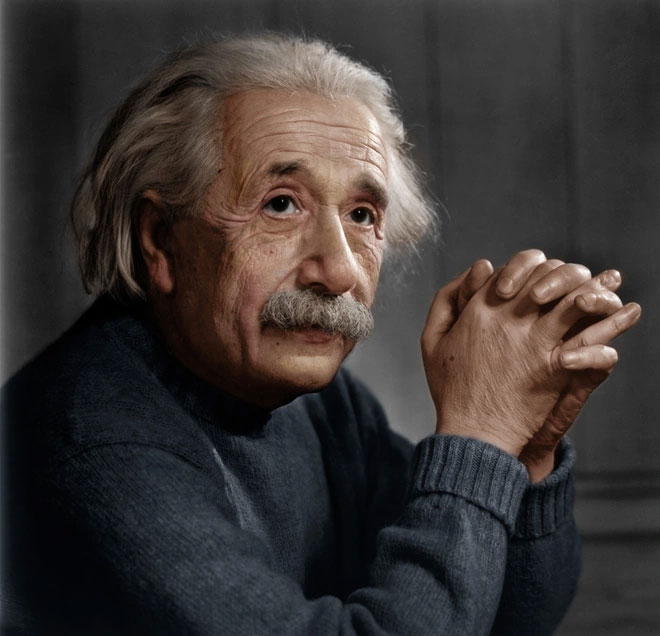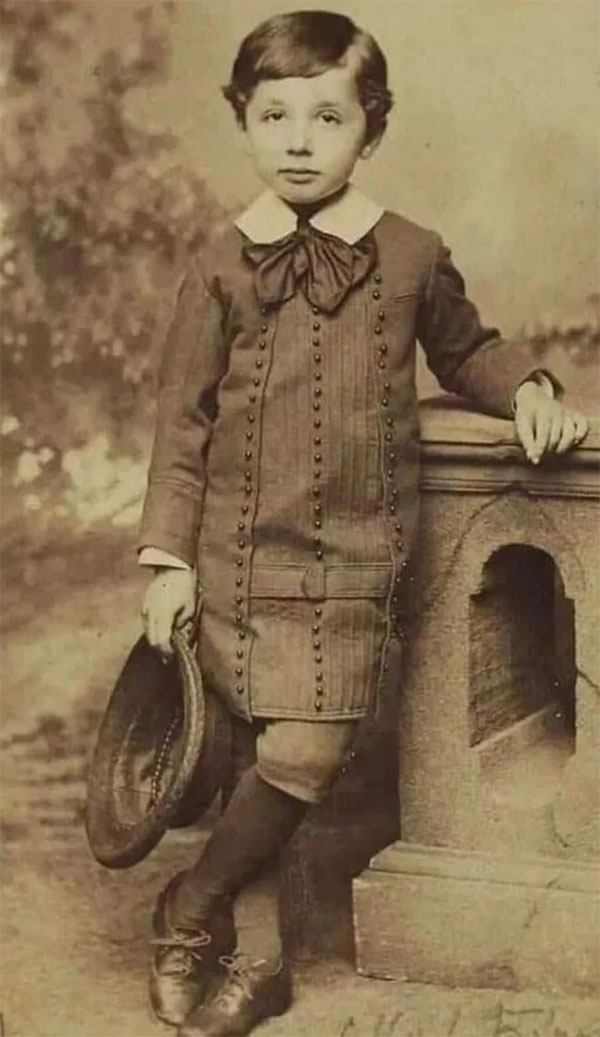Albert Einstein - the genius born in the year of the Cat and the great invention that changed the world
Considered the greatest mind of mankind, Time magazine called Albert Einstein 'Person of the Century' - a man who had a great influence on humanity for thousands of years. His great intellectual achievements made the name 'Einstein' synonymous with the word 'genius'.
Not only was Albert Einstein (March 14, 1879 - April 18, 1955) the greatest physicist of all time, he was also an icon of popular culture. His theory of relativity , with its famous formula E = mc2 , was the foundation of the development of atomic energy and one of the scientific foundations of modern theories of the universe.

Albert Einstein (March 14, 1879 - April 18, 1955).
His research also contributed significantly to the discovery of the secrets of DNA, to the revolution of modern computer technology, as well as promoting all modern physical theories to develop together in the direction of unifying the microscopic and macroscopic worlds.
Albert Einstein - "hero" of modern science
Famous for having a "genius brain" , however, Albert Einstein's childhood was not as beautiful as other great people in the world.

Albert Einstein was once a different boy. (Photo: ESP).
Albert Einstein was born on March 14, 1879, in Ulm, Baden-Wurttemberg, Germany. Right from birth, the German physicist was diagnosed by doctors as having a developmental delay due to his limited ability to speak. However, his unusually stubborn nature, always disobeying the rules, was revealed when he was only 5 years old, proving that he would become a genius in the future.
His passion for science was ignited when his family moved to Munich to establish an electrical engineering company. The scientist once said that two things brought him to the world of science: a compass given to him by his father when he was 5 years old and his favorite geometry book when he was 12.
However, his studies were repeatedly interrupted by the family's business failures. At the age of 17, he entered the Zurich Polytechnic University to train as a teacher of mathematics and physics.
After graduating, he worked as a technical secretary for a Swiss patent office. In order to have time for scientific research and invention, he always tried to complete his office work in the shortest time possible.
Great inventions that changed the world
Named "Person of the Century" by Times magazine , physicist Albert Einstein and his great achievements beyond the imagination of ordinary people, typically Einstein's theory of relativity, have caused a remarkable "transformation" in the " situation " of human science .
 Einstein had a huge influence on humanity for thousands of years. (Photo: Getty Images)
Einstein had a huge influence on humanity for thousands of years. (Photo: Getty Images)
Special relativity
One of Einstein's earliest and most influential achievements of his time was the special theory of relativity – published in a paper in 1905. His work showed the relationship between space-time and related phenomena, thereby completely changing the way scientists viewed space and time.
The birth of the special theory of relativity has brought great changes to humanity through applications in daily life, notably the global positioning system GPS or electromagnets.
Law of energy and mass E = mc2
One of the unexpected "Cultural Icon" turns in the process of researching the Special Theory of Relativity is the equation E = mc2. This is a mathematical equation built by Einstein to express the relationship between "matter and energy".
Einstein's formula has brought a new look to human science when applied in the formation of nuclear reactors, or determining the age of ancient artifacts using the radioactive isotope Carbon 14.
General relativity
In 1915, Einstein published his scientific work called General Theory of Relativity to the Prussian Academy of Sciences, thereby changing the perception of space-time and opening a door to the universe with interesting discoveries about black holes.
Considered the most revolutionary scientific theory in history, general relativity explains how time and motion appear relative to an observer. Some of the most notable consequences of this theory include a deeper understanding of the formation and evolution of the universe, the Big Bang, black holes, and gravitational waves.
Quantum theory of light
With this research, physicist Einstein helped scientists know that both light and matter consist of small particles with properties similar to coherent waves. Light consists of particles called photons, and matter consists of electrons, protons, neutrons. Accordingly, the consequence of this theory is the photoelectric effect - the premise for the invention of TV and devices with screens.
The quantum theory of light became a significant achievement for Einstein and helped him win the Nobel Prize in Physics in 1921.
Is a measure of human intelligence

Einstein never underwent any formal mental tests while he was alive.
An interesting fact is that Einstein never underwent any formal intelligence tests while he was alive, even though such intelligence tests were widely used in schools.
Therefore, based on biographical data, experts determined his IQ to be between 160 and 180 – a number reserved for geniuses.
Numbers cannot completely tell the truth about a person's wisdom, because IQ scores also change depending on objective factors as well as covering that person's abilities in life.
However, Albert Einstein's extraordinary intelligence is undeniable, so he is the most accurate and specific measure of a genius brain.
- Top 7 works that changed the world of Albert Einstein
- Interesting truth: The outstanding ideas of genius physicist Albert Einstein appeared during his ... free time
- The son carries the 'bad gene' of genius Albert Einstein
- What helped Albert Einstein become a genius?
- What scientists did with Albert Einstein's brain
- The secret of the illegitimate daughter 'seems to be invisible to the whole world' of genius Albert Einstein
- Childhood of great geniuses
- Display a part of the brain of Einstein genius
- The secret of Albert Einstein's stormy affairs
- Strange habits of Albert Einstein's genius and lessons hidden later
- Why did Albert Einstein become a genius?
- Albert Einstein's career and private life
 The most famous scientific failures in history
The most famous scientific failures in history Mysterious genius mechanic and the machine froze time
Mysterious genius mechanic and the machine froze time The son carries the 'bad gene' of genius Albert Einstein
The son carries the 'bad gene' of genius Albert Einstein Isaac Newton
Isaac Newton The Tragedy of Albert Einstein's Children: One Disappeared Mysteriously, One Went Crazy and Died Alone
The Tragedy of Albert Einstein's Children: One Disappeared Mysteriously, One Went Crazy and Died Alone  Top 7 works that changed the world of Albert Einstein
Top 7 works that changed the world of Albert Einstein  Why do 86.2% of scientists prefer Newton over Einstein?
Why do 86.2% of scientists prefer Newton over Einstein?  What did Albert Einstein write in a letter to Marie Curie in 1911?
What did Albert Einstein write in a letter to Marie Curie in 1911?  Solar eclipse proves the genius and extraordinary intelligence of Albert Einstein
Solar eclipse proves the genius and extraordinary intelligence of Albert Einstein  The story behind the eccentric photo of Einstein sticking out his tongue
The story behind the eccentric photo of Einstein sticking out his tongue 